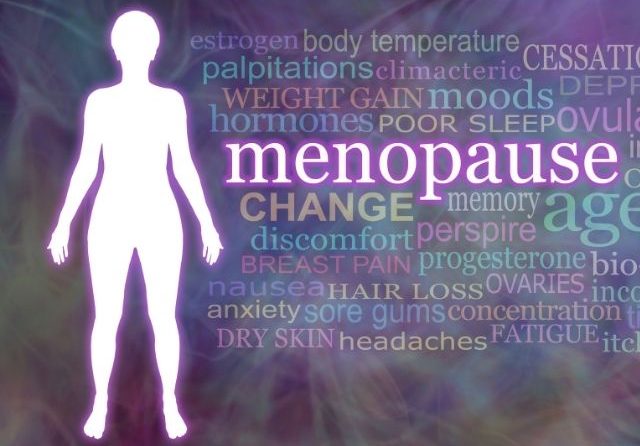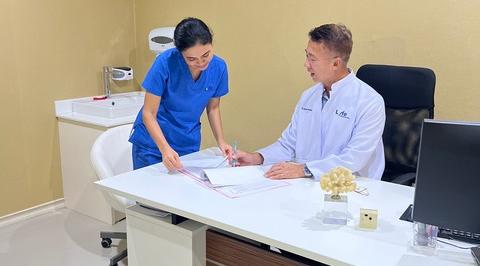
What Is Menopause And Andropause
Menopause is the timing in a woman’s life when her period stops. It is a natural matter, most women experience that after age 45. Menopause occurs as a result of the cessation of the woman’s ovaries’ production of the hormones estrogen and progesterone.
Women reach menopause when they had not had a period for one year. There are various physiological changes that happen within menopause.
Below are the different signs and symptoms of body changes related to menopause.
Menopause symptoms
The most obvious symptom is the stop of menses typically boded by changes related to the menstrual cycle.
Vasomotor Symptoms
About 75% of women have vasomotor symptoms like hot flashes, migraines, night sweats, and palpitations.
Hot flashes continue from 3 to 4 minutes which may be worsened by alcohol, eating, emotional stress, and physical exertion.
Migraines vary in severity. Migraines without aura are more common. Migraines that are associated with aura have an increased risk of experiencing stroke if women smoke or use oral contraceptives. There are other types of headaches like cluster and tension headaches that can increase with changes in hormone levels.
Urogenital Symptoms
About 60% of women experience urogenital symptoms as vaginal atrophy that lead to dryness, pruritus, and dyspareunia (painful intercourse), urethral atrophy (results in stress incontinence, frequency, urgency, and dysuria), and sexual dysfunction including a decrease of concupiscence.
Psychogenic Symptoms
Regarding the psychogenic symptoms, 45% of women experience them. They can have anger, irritability, anxiety, tension, depression, sleep disturbance, loss of concentration, and loss of confidence.
Signs of menopause
- Elevated blood pressure.
- weight gain that may be noticed and decrease of height as well, the evidence here is that the North American Menopause Society stated women gained about 2 kg over the menopause transitional period. Besides a decrease in height may be noted, linked with osteoporosis and spine fractures.
- Decreased breast size that can be felt during breast palpation.
Causes of hot flashes postmenopausal
The exact mechanism of hot flashes is unknown, but various studies are showing that hot flashes result from a central thermoregulatory function defect. Different hormones and neurotransmitters adjust vasomotor symptoms, most significantly, estrogen. There is a theory that indicates that estrogen withdrawal is the initial cause that leads to hot flashes. Norepinephrine and serotonin also have a role in the defect in thermoregulation. The evidence here is that plasma levels of norepinephrine metabolites increase before and during a hot flash.
Management of menopausal symptoms
Hormone therapy
Hormonal therapy plays an important role in treating vasomotor symptoms and preventing associated vaginal and urogenital atrophy, as well as inhibiting bone loss.
Hormonal therapy has various forms (tablets, creams, patches) and is presentable as systemic estrogen, estrogen-progestin, estrogen-bazedoxifene, progestin alone, or combined oral contraceptives.
The administration of combination estrogen-progestin therapy is recommended for women with an intact uterus. It decreases the intensity and frequency of hot flashes and improves urogenital atrophy and sleep disturbances. It also inhibits osteoporosis and associated fractures.
It is also recommended that hormone therapy should be used under doctor prescription following individual test results of hormone checks.
Non-hormonal treatment
Non-hormonal treatment as selective serotonin reuptake inhibitors, serotonin-norepinephrine reuptake inhibitors, gabapentin, and clonidine. These treatments can be used for a few months for handling the menopause symptoms. They can treat vasomotor symptoms like hot flashes and lead to one fewer hot flashes a day. Paroxetine, especially, is the only FDA-approved drug for that use, and symptoms can disappear obviously within a week from the start of the treatment.
It is also found that vitamin e and omega-3 fatty acids have been utilized to treat and handle the vasomotor symptoms of menopause.
Male andropause is a condition where men suffer from various symptoms because of the presence of low androgen levels that decreases obviously with aging.
Causes of andropause
The etiology of testosterone decrease can be related to various factors.
- Alterations happen within the Leydig cells and age-associated changes within the dynamics of the hypothalamic-pituitary-gonadal axis.
- hereditary factors.
- obesity, and unbalanced healthy diet.
- stress also has a role in the low percentage of the level of androgen and depression.
- chronic diseases as diabetes mellitus, and chronic liver disease.
- It was found that some medications contribute to that defect as glucocorticoids.
- smoking and alcohol intake also have their effects towards that decease.
Treatment of andropause
Testosterone therapy
There are different forms of testosterone preparations that are suitable for men with andropause symptoms.
These can be oral agents, injectable formulations, transdermal patches, transdermal gels, or buccal tablets. (7)
Over the counter treatment for andropause
There are other options other than the testosterone therapy that can regain the needed level of testosterone like;
- Lifestyle changes as getting enough time to sleep, and doing exercises. It had been found that exercises can reduce stress which increases the body cortisol levels which negatively impacts sex hormone production.
- Eating a healthy diet.
- Key nutrients that enhance healthy testosterone levels are vitamin D and zinc.
- Some examples of foods you can include in the diet:
- Salmon, spinach, eggs, nuts such as cashews, almonds, and walnuts.
- Seeds such as pumpkin, squash, pine nuts, and flaxseeds
- Beans such as baked beans, and kidney beans. (9, 10)
Differences between andropause and menopause
- Menopause can lead to infertility eventually, but andropause cannot.
- It is a scientific fact that the onset of menopause usually is an obvious sign of the end of a woman’s biological clock.
- A women’s ability to be pregnant is irreversible.
- Menopause affects all women, andropause affects men with low testosterone levels.
- Menopause is linked with a significant and rapid decrease of the hormones related to this condition, but andropause has a gradual decrease of its included hormones. That is according to physicians in Atlanta.
It is recommended to check your hormones level within menopause time.
It is better to follow up with your doctor who can send a sample of your blood to a lab for being tested. Most hormones can be detected easily in the blood




